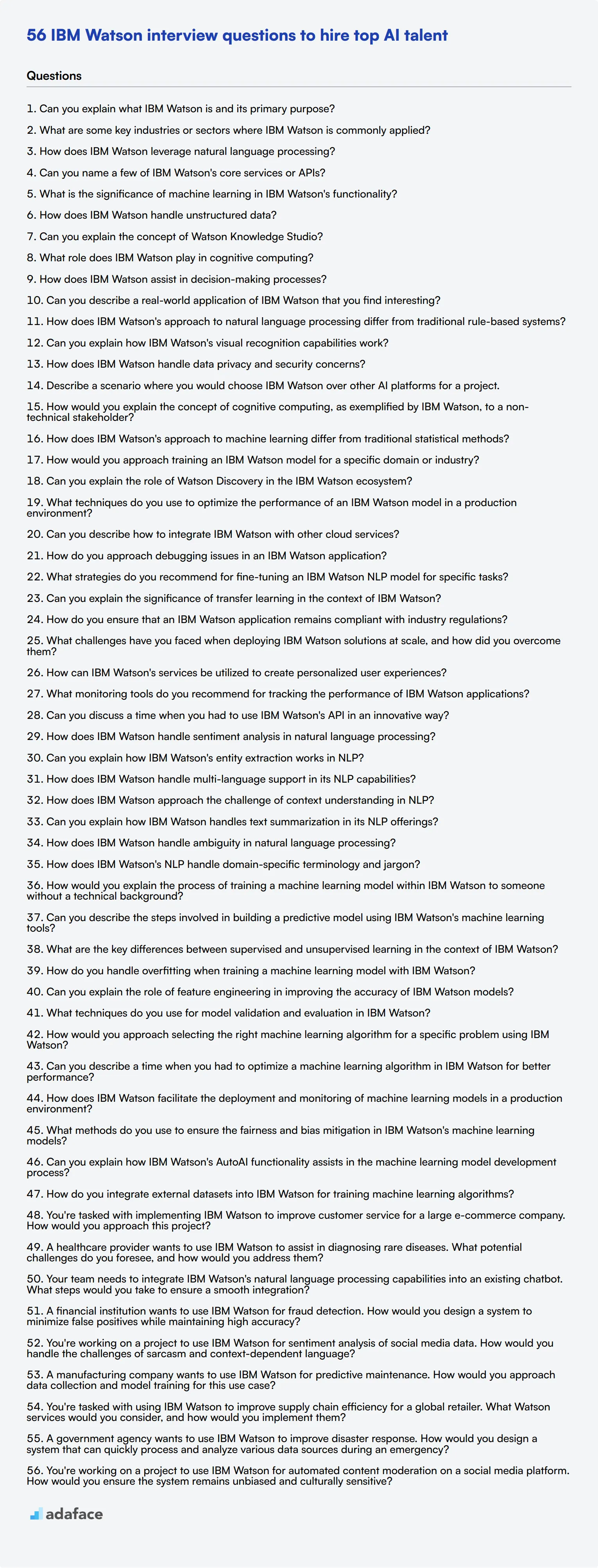When preparing for IBM Watson interviews, it's essential to ask the right questions to identify top-tier candidates. This list of questions will help you assess their proficiency and fit for your team.
In this blog post, you'll find a carefully curated list of interview questions categorized by level of expertise: junior data scientists, senior developers, natural language processing, machine learning algorithms, and situational questions for analysts. Each section will help you pinpoint the skills and knowledge required for working with IBM Watson.
Using these questions, you can effectively evaluate candidates and ensure that you hire the best talent for your team. Additionally, consider utilizing assessments like our machine learning online test to streamline your pre-interview process.
Table of contents
10 IBM Watson interview questions to initiate the interview
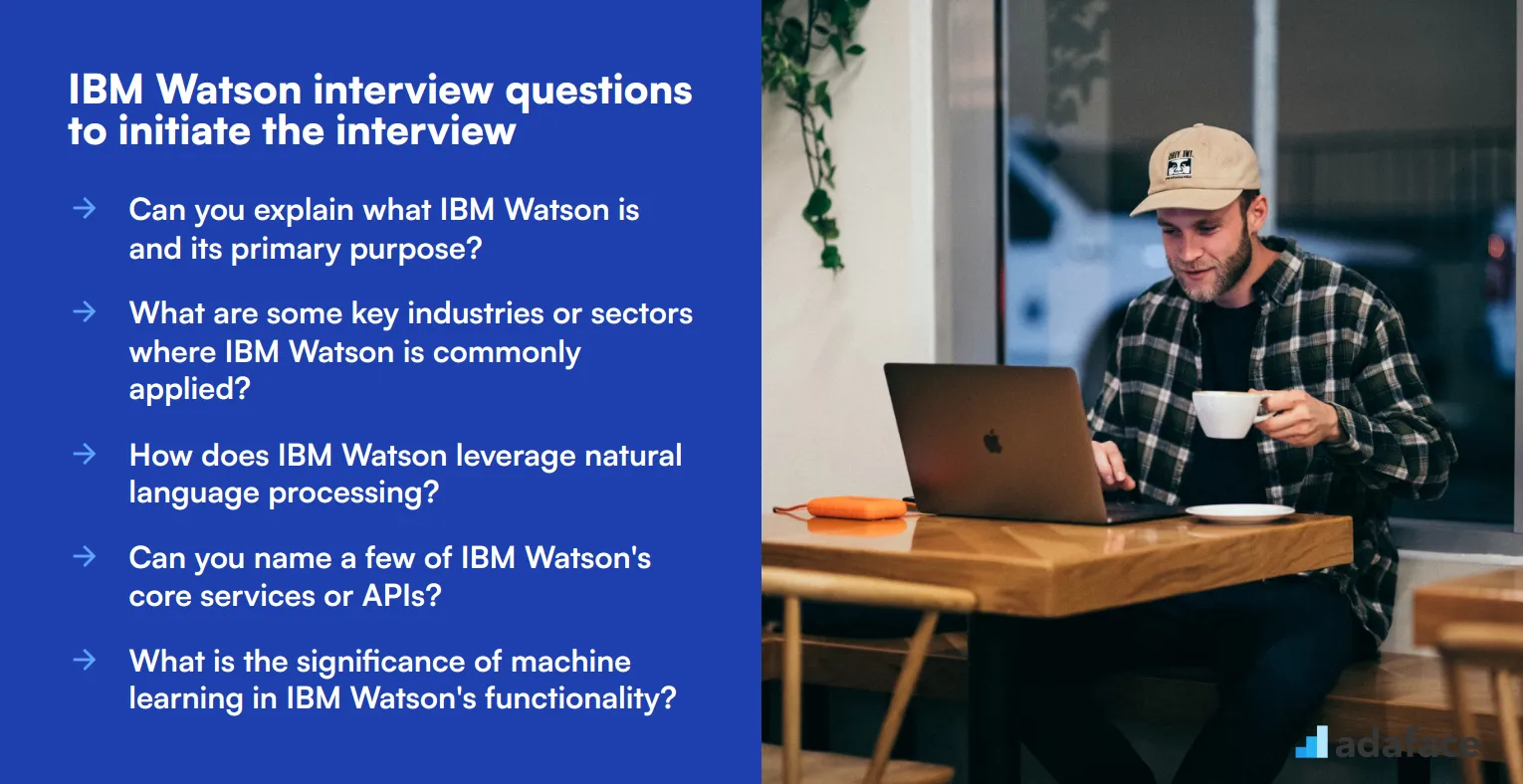
To kickstart your interview process and gauge candidates' understanding of IBM Watson, use these 10 introductory questions. These queries will help you assess a candidate's basic knowledge and familiarity with Watson's core concepts, setting the stage for a more in-depth technical discussion.
- Can you explain what IBM Watson is and its primary purpose?
- What are some key industries or sectors where IBM Watson is commonly applied?
- How does IBM Watson leverage natural language processing?
- Can you name a few of IBM Watson's core services or APIs?
- What is the significance of machine learning in IBM Watson's functionality?
- How does IBM Watson handle unstructured data?
- Can you explain the concept of Watson Knowledge Studio?
- What role does IBM Watson play in cognitive computing?
- How does IBM Watson assist in decision-making processes?
- Can you describe a real-world application of IBM Watson that you find interesting?
8 IBM Watson interview questions and answers to evaluate junior data scientists
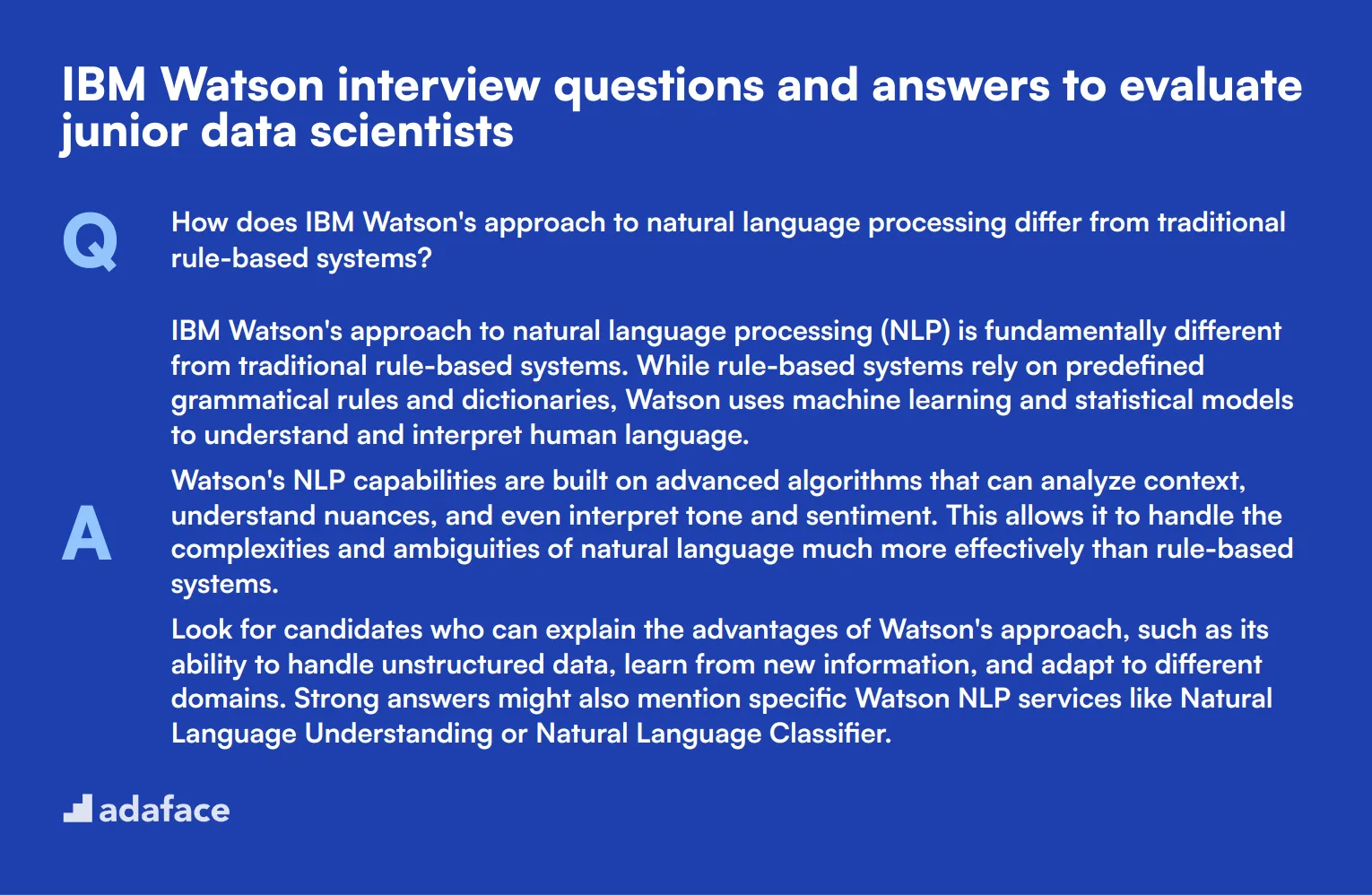
Ready to put your junior data scientists through their paces? These 8 IBM Watson interview questions will help you evaluate candidates' understanding of this powerful AI platform. Use them to gauge both theoretical knowledge and practical application skills, ensuring you find the right fit for your team's Watson-powered projects.
1. How does IBM Watson's approach to natural language processing differ from traditional rule-based systems?
IBM Watson's approach to natural language processing (NLP) is fundamentally different from traditional rule-based systems. While rule-based systems rely on predefined grammatical rules and dictionaries, Watson uses machine learning and statistical models to understand and interpret human language.
Watson's NLP capabilities are built on advanced algorithms that can analyze context, understand nuances, and even interpret tone and sentiment. This allows it to handle the complexities and ambiguities of natural language much more effectively than rule-based systems.
Look for candidates who can explain the advantages of Watson's approach, such as its ability to handle unstructured data, learn from new information, and adapt to different domains. Strong answers might also mention specific Watson NLP services like Natural Language Understanding or Natural Language Classifier.
2. Can you explain how IBM Watson's visual recognition capabilities work?
IBM Watson's visual recognition capabilities are based on deep learning neural networks. These networks are trained on vast datasets of images to recognize and classify visual content. When presented with a new image, Watson can identify objects, scenes, faces, colors, and even text within the image.
The process involves several steps: first, the image is preprocessed and normalized. Then, it's passed through multiple layers of the neural network, each extracting increasingly complex features. Finally, the output layer provides classifications or detections based on the learned patterns.
Look for candidates who can discuss the importance of training data quality, the concept of transfer learning in visual recognition, and potential applications of this technology. Strong answers might also touch on challenges in computer vision like handling variations in lighting, angle, or occlusion.
3. How does IBM Watson handle data privacy and security concerns?
IBM Watson takes data privacy and security very seriously. It employs a multi-layered approach to protect sensitive information. This includes encryption of data both in transit and at rest, strict access controls, and regular security audits.
Watson also offers features like data isolation, where each client's data is kept separate from others. For highly sensitive applications, IBM provides options for on-premises deployment or dedicated cloud instances, ensuring that data never leaves the client's control.
Strong candidates should discuss the importance of compliance with data protection regulations like GDPR or HIPAA, depending on the industry. They might also mention Watson's ability to anonymize or mask sensitive data during processing, and the option to delete training data after model creation.
4. Describe a scenario where you would choose IBM Watson over other AI platforms for a project.
A strong answer might describe a healthcare project involving analysis of unstructured medical data. For example, using Watson to process patient records, medical literature, and clinical trial data to assist in diagnosis or treatment planning.
Watson would be an excellent choice for this scenario due to its strong natural language processing capabilities, its ability to handle large volumes of unstructured data, and its specific healthcare-focused tools like Watson for Oncology.
Look for candidates who can articulate Watson's strengths in relation to the project requirements. They should be able to explain why Watson's capabilities in areas like natural language understanding, knowledge representation, and machine learning make it particularly suited for complex, domain-specific tasks in fields like healthcare, finance, or legal services.
5. How would you explain the concept of cognitive computing, as exemplified by IBM Watson, to a non-technical stakeholder?
A good explanation might go something like this: 'Imagine having a super-smart assistant who can read through millions of documents in seconds, understand complex questions, and provide well-reasoned answers. That's essentially what cognitive computing does. IBM Watson is like a brain that can process vast amounts of information, learn from it, and use that knowledge to solve problems or answer questions.'
The candidate might continue: 'Unlike traditional computers that just follow pre-programmed instructions, Watson can understand context, learn from experience, and even reason about problems. It's designed to work alongside humans, augmenting our capabilities rather than replacing us.'
Look for candidates who can simplify complex concepts without losing accuracy. They should be able to use relatable analogies and focus on the practical benefits of cognitive computing, such as faster decision-making, more personalized customer experiences, or the ability to uncover insights from large datasets.
6. How does IBM Watson's approach to machine learning differ from traditional statistical methods?
IBM Watson's approach to machine learning goes beyond traditional statistical methods by incorporating advanced techniques like deep learning and neural networks. While statistical methods often rely on predefined models and assumptions about data distributions, Watson's machine learning algorithms can automatically discover patterns and relationships in data.
Watson's machine learning capabilities are particularly powerful when dealing with unstructured data like text, images, or speech. It can handle much larger and more complex datasets than traditional methods, and can often find non-linear relationships that might be missed by simpler models.
Look for candidates who can explain the advantages of Watson's approach, such as its ability to handle high-dimensional data, its capacity for transfer learning (applying knowledge from one domain to another), and its potential for continuous learning and improvement over time. Strong answers might also touch on the importance of big data in enabling these advanced machine learning techniques.
7. How would you approach training an IBM Watson model for a specific domain or industry?
Training an IBM Watson model for a specific domain involves several key steps. First, you'd need to gather a large, diverse dataset representative of the domain. This might include industry-specific documents, customer interactions, or expert knowledge.
Next, you'd use Watson's tools to preprocess and analyze this data, identifying key concepts, entities, and relationships. You'd then train Watson's various components (like natural language understanding, dialog management, etc.) on this domain-specific data. This process often involves iterative refinement, testing the model's performance and adjusting as needed.
Look for candidates who emphasize the importance of domain expertise in this process. They should mention the need for collaboration between data scientists and subject matter experts. Strong answers might also discuss strategies for handling domain-specific jargon or concepts, and the importance of continuously updating the model as new information becomes available in the field.
8. Can you explain the role of Watson Discovery in the IBM Watson ecosystem?
Watson Discovery is a crucial component of the IBM Watson ecosystem, focused on extracting insights from large volumes of unstructured data. It combines advanced natural language processing with powerful search and analytics capabilities to help organizations uncover patterns, trends, and relationships in their data.
Some key features of Watson Discovery include its ability to understand context and meaning in text, its support for multiple languages, and its integration with other Watson services. It can be used for tasks like content recommendation, research assistance, and automated customer support.
Look for candidates who can explain practical applications of Watson Discovery, such as analyzing customer feedback to improve products, or mining research papers for new scientific insights. Strong answers might also touch on how Watson Discovery can be customized for specific domains using Watson Knowledge Studio, demonstrating an understanding of the broader Watson ecosystem.
10 advanced IBM Watson interview questions to ask senior developers
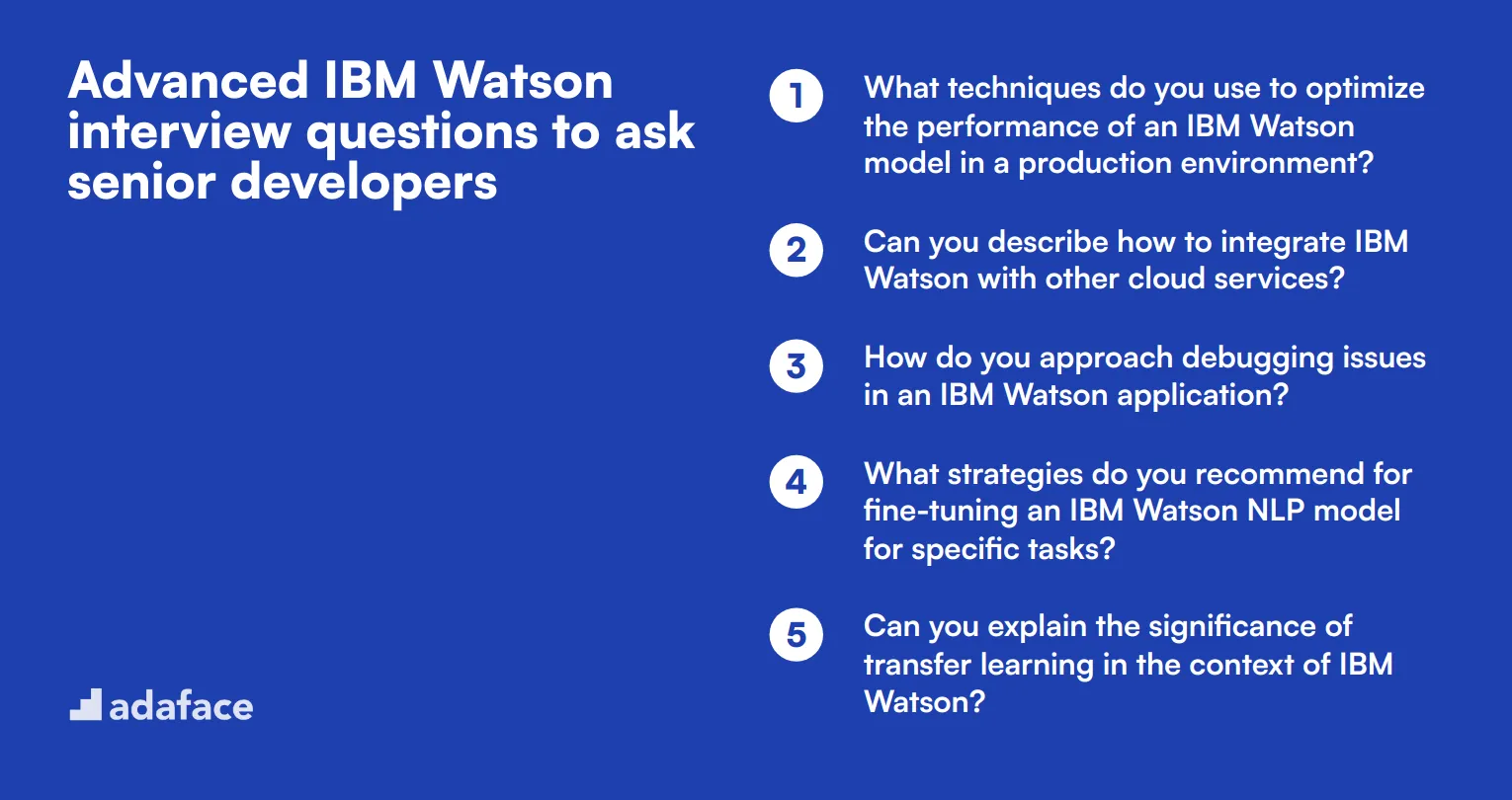
To ensure your candidates possess the advanced technical skills required for IBM Watson development, consider using this list of interview questions. These inquiries will help gauge their expertise and ability to tackle complex challenges in areas like natural language processing and machine learning, crucial for roles such as data scientists.
- What techniques do you use to optimize the performance of an IBM Watson model in a production environment?
- Can you describe how to integrate IBM Watson with other cloud services?
- How do you approach debugging issues in an IBM Watson application?
- What strategies do you recommend for fine-tuning an IBM Watson NLP model for specific tasks?
- Can you explain the significance of transfer learning in the context of IBM Watson?
- How do you ensure that an IBM Watson application remains compliant with industry regulations?
- What challenges have you faced when deploying IBM Watson solutions at scale, and how did you overcome them?
- How can IBM Watson's services be utilized to create personalized user experiences?
- What monitoring tools do you recommend for tracking the performance of IBM Watson applications?
- Can you discuss a time when you had to use IBM Watson's API in an innovative way?
7 IBM Watson interview questions and answers related to natural language processing
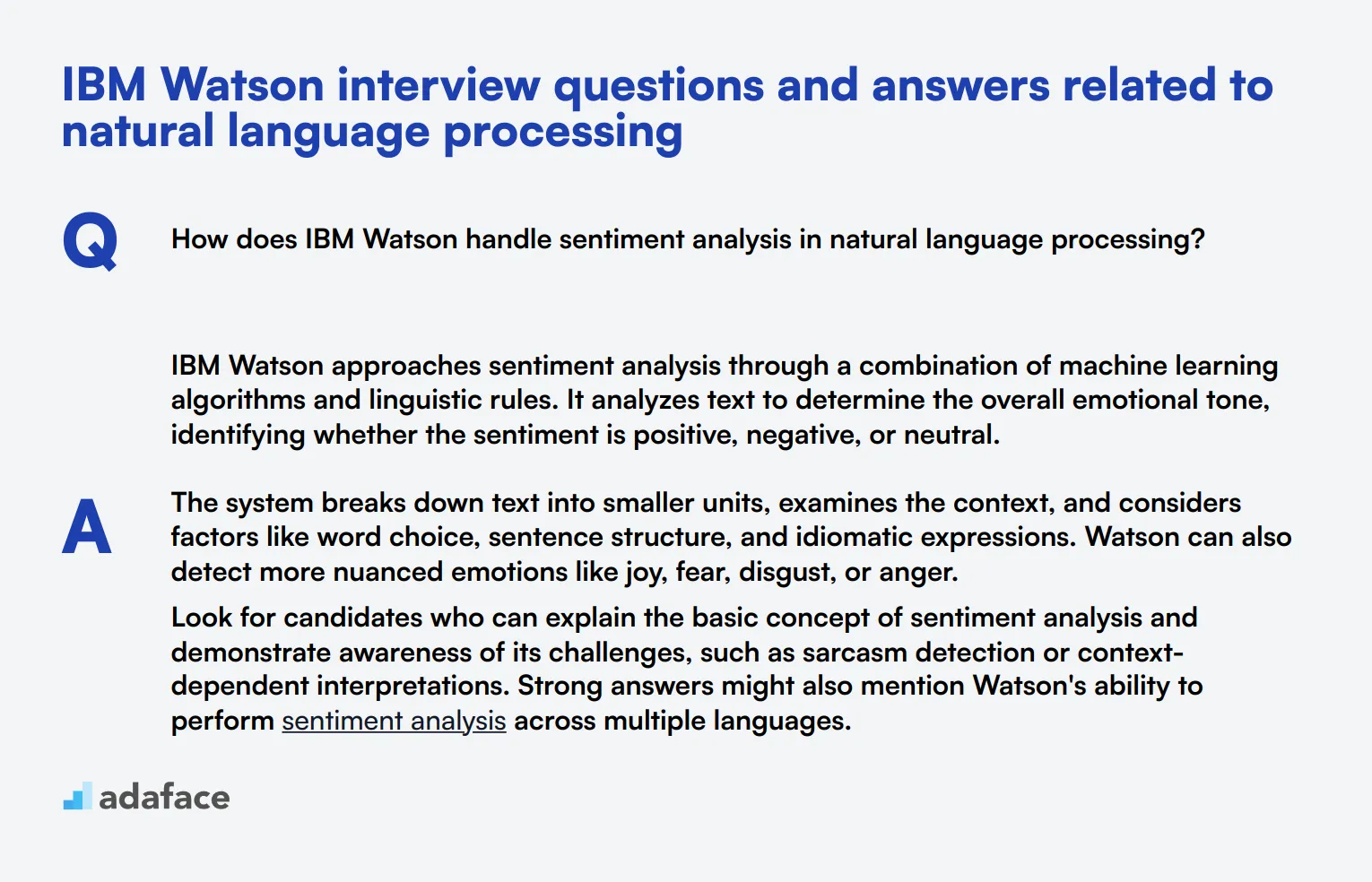
Ready to dive into the world of natural language processing with IBM Watson? These seven interview questions will help you gauge candidates' understanding of Watson's NLP capabilities. Use them to uncover insights into how applicants approach language analysis and processing, and to spark discussions about real-world NLP applications.
1. How does IBM Watson handle sentiment analysis in natural language processing?
IBM Watson approaches sentiment analysis through a combination of machine learning algorithms and linguistic rules. It analyzes text to determine the overall emotional tone, identifying whether the sentiment is positive, negative, or neutral.
The system breaks down text into smaller units, examines the context, and considers factors like word choice, sentence structure, and idiomatic expressions. Watson can also detect more nuanced emotions like joy, fear, disgust, or anger.
Look for candidates who can explain the basic concept of sentiment analysis and demonstrate awareness of its challenges, such as sarcasm detection or context-dependent interpretations. Strong answers might also mention Watson's ability to perform sentiment analysis across multiple languages.
2. Can you explain how IBM Watson's entity extraction works in NLP?
Entity extraction in IBM Watson, also known as named entity recognition (NER), involves identifying and classifying key information in text into predefined categories. These categories typically include names of people, organizations, locations, dates, and other domain-specific entities.
Watson uses a combination of machine learning models and rule-based systems to perform entity extraction. It analyzes the context and structure of sentences to accurately identify entities, even when they're presented in various formats or with different spellings.
Strong candidates should be able to explain the basic concept of entity extraction and its importance in NLP. Look for answers that mention Watson's ability to be trained on domain-specific entities and its capacity to understand relationships between extracted entities.
3. How does IBM Watson handle multi-language support in its NLP capabilities?
IBM Watson's multi-language support in NLP is built on a foundation of language-agnostic machine learning models. These models are trained on vast amounts of data from various languages, allowing Watson to understand and process text in multiple languages without requiring separate models for each language.
Watson uses techniques like transfer learning and neural machine translation to adapt its understanding across languages. It can perform tasks such as sentiment analysis, entity extraction, and text classification in numerous languages, often with comparable accuracy to language-specific models.
Look for candidates who understand the challenges of multi-language NLP, such as handling different grammatical structures or idiomatic expressions. Strong answers might also mention Watson's ability to detect language automatically and its support for less common languages.
4. How does IBM Watson approach the challenge of context understanding in NLP?
IBM Watson tackles context understanding through a combination of deep learning models and knowledge graphs. It uses advanced neural network architectures, such as transformers, to capture long-range dependencies and contextual information within text.
Watson's approach involves analyzing not just individual words, but also their relationships within sentences and broader documents. It leverages its vast knowledge base to understand contextual nuances, idiomatic expressions, and domain-specific terminology.
Ideal candidates should be able to explain the importance of context in NLP and some of the challenges involved, such as resolving ambiguities or understanding implicit information. Look for answers that demonstrate an understanding of how machine learning models can be trained to capture contextual information.
5. Can you explain how IBM Watson handles text summarization in its NLP offerings?
IBM Watson approaches text summarization using both extractive and abstractive methods. Extractive summarization involves selecting key sentences or phrases from the original text to form a summary. Abstractive summarization, on the other hand, generates new sentences that capture the essence of the original content.
Watson uses advanced machine learning models, including deep learning and transformer-based architectures, to understand the content and generate coherent summaries. It can identify the most important information, recognize redundancies, and maintain the overall context and meaning of the original text.
Look for candidates who can explain the difference between extractive and abstractive summarization. Strong answers might also touch on the challenges of text summarization, such as maintaining coherence or handling domain-specific content.
6. How does IBM Watson handle ambiguity in natural language processing?
IBM Watson tackles ambiguity in NLP through a multi-faceted approach. It uses context analysis, probabilistic modeling, and knowledge bases to disambiguate words, phrases, and sentences that have multiple possible interpretations.
Watson's system considers various factors such as surrounding words, sentence structure, document context, and even external knowledge to resolve ambiguities. It can handle lexical ambiguity (words with multiple meanings), syntactic ambiguity (sentences with multiple grammatical interpretations), and semantic ambiguity (phrases with multiple possible meanings).
Strong candidates should be able to explain different types of ambiguity in language and why they pose challenges for NLP systems. Look for answers that demonstrate an understanding of how machine learning and knowledge-based approaches can be combined to handle ambiguity effectively.
7. How does IBM Watson's NLP handle domain-specific terminology and jargon?
IBM Watson's approach to handling domain-specific terminology involves a combination of pre-trained models and customizable components. Its base NLP models are trained on diverse datasets, giving them a broad understanding of language. However, Watson also provides tools for fine-tuning these models on domain-specific corpora.
Watson Knowledge Studio, for instance, allows users to train custom models that can recognize industry-specific entities, relationships, and concepts. This enables Watson to accurately process and understand specialized vocabulary and jargon across various fields, from healthcare to finance to technical domains.
Look for candidates who understand the challenges of processing domain-specific language and the importance of customization in NLP systems. Strong answers might mention techniques like transfer learning or discuss the balance between general language understanding and domain-specific accuracy.
12 IBM Watson interview questions related to machine learning algorithms
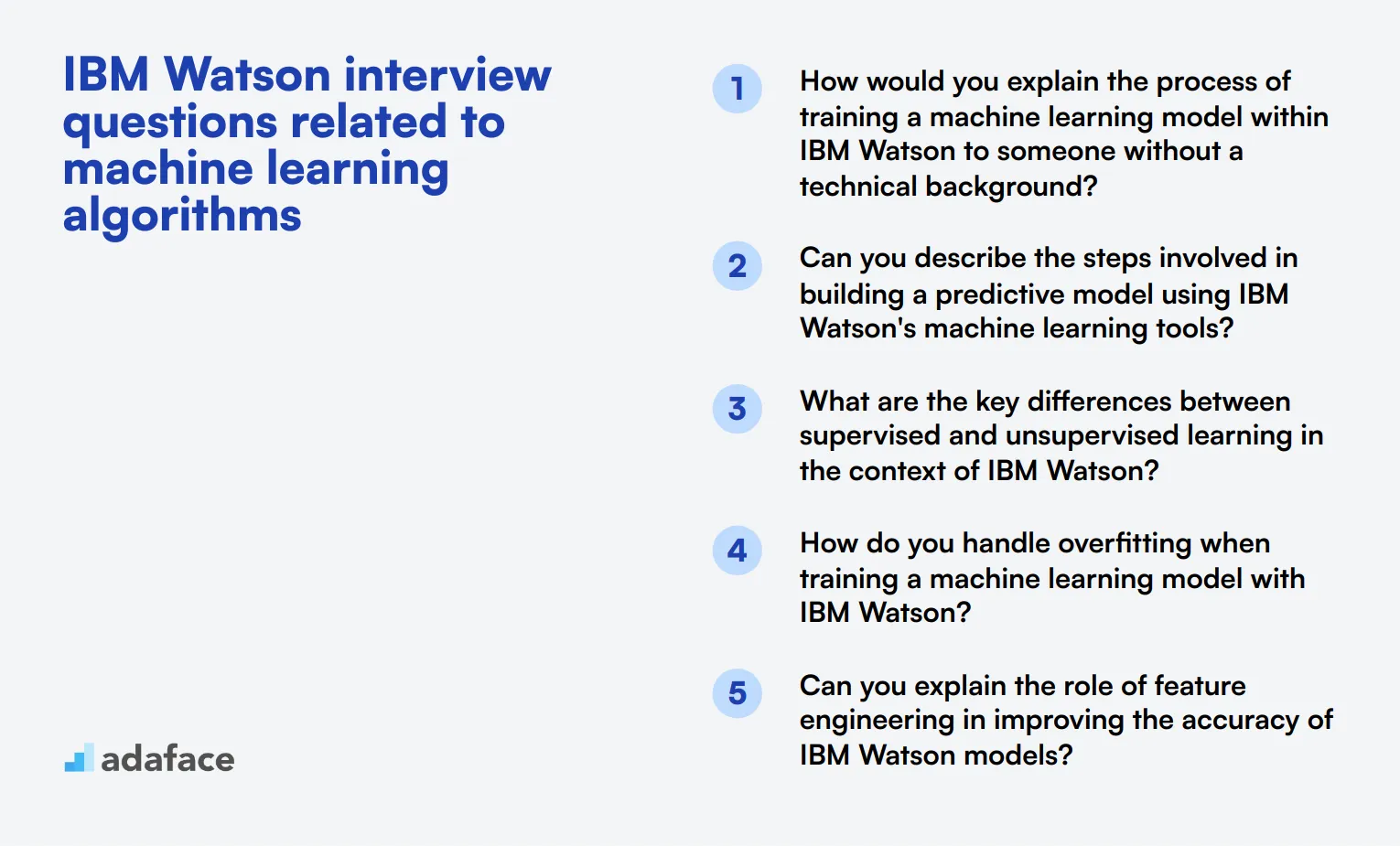
To evaluate candidates' proficiency with machine learning algorithms in the context of IBM Watson, use these questions during your interview process. This list is designed to help you identify individuals with the right technical understanding and practical experience, ensuring they can effectively leverage IBM Watson's capabilities.
- How would you explain the process of training a machine learning model within IBM Watson to someone without a technical background?
- Can you describe the steps involved in building a predictive model using IBM Watson's machine learning tools?
- What are the key differences between supervised and unsupervised learning in the context of IBM Watson?
- How do you handle overfitting when training a machine learning model with IBM Watson?
- Can you explain the role of feature engineering in improving the accuracy of IBM Watson models?
- What techniques do you use for model validation and evaluation in IBM Watson?
- How would you approach selecting the right machine learning algorithm for a specific problem using IBM Watson?
- Can you describe a time when you had to optimize a machine learning algorithm in IBM Watson for better performance?
- How does IBM Watson facilitate the deployment and monitoring of machine learning models in a production environment?
- What methods do you use to ensure the fairness and bias mitigation in IBM Watson's machine learning models?
- Can you explain how IBM Watson's AutoAI functionality assists in the machine learning model development process?
- How do you integrate external datasets into IBM Watson for training machine learning algorithms?
9 situational IBM Watson interview questions for hiring top analysts
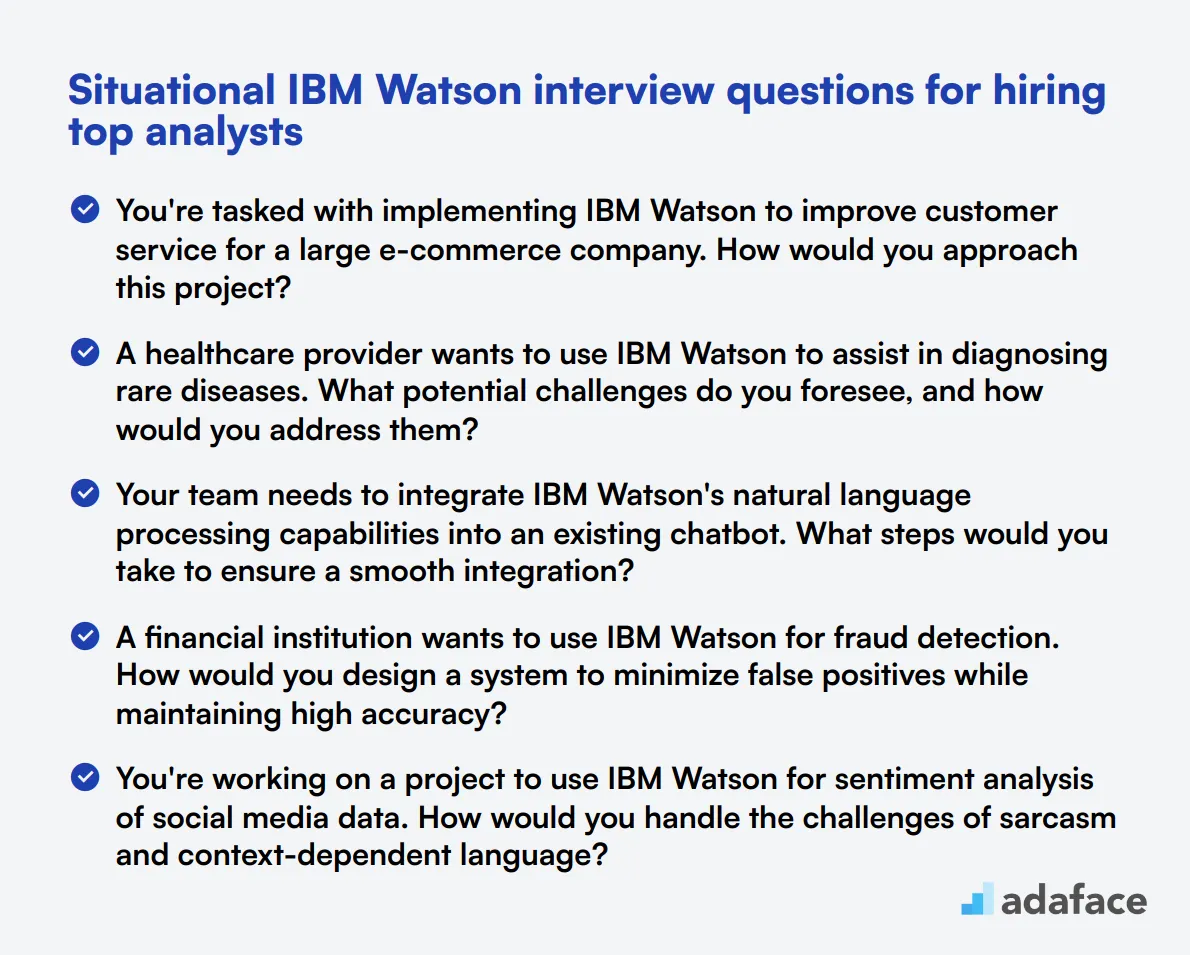
To assess candidates' ability to apply IBM Watson in real-world scenarios, consider using these situational interview questions. They help evaluate a candidate's problem-solving skills and practical understanding of Watson's capabilities in various business contexts.
- You're tasked with implementing IBM Watson to improve customer service for a large e-commerce company. How would you approach this project?
- A healthcare provider wants to use IBM Watson to assist in diagnosing rare diseases. What potential challenges do you foresee, and how would you address them?
- Your team needs to integrate IBM Watson's natural language processing capabilities into an existing chatbot. What steps would you take to ensure a smooth integration?
- A financial institution wants to use IBM Watson for fraud detection. How would you design a system to minimize false positives while maintaining high accuracy?
- You're working on a project to use IBM Watson for sentiment analysis of social media data. How would you handle the challenges of sarcasm and context-dependent language?
- A manufacturing company wants to use IBM Watson for predictive maintenance. How would you approach data collection and model training for this use case?
- You're tasked with using IBM Watson to improve supply chain efficiency for a global retailer. What Watson services would you consider, and how would you implement them?
- A government agency wants to use IBM Watson to improve disaster response. How would you design a system that can quickly process and analyze various data sources during an emergency?
- You're working on a project to use IBM Watson for automated content moderation on a social media platform. How would you ensure the system remains unbiased and culturally sensitive?
Which IBM Watson skills should you evaluate during the interview phase?
While it's challenging to assess every aspect of a candidate's skills in a single interview, focusing on core IBM Watson competencies is crucial. The following skills are particularly important to evaluate during the interview process for IBM Watson-related positions.
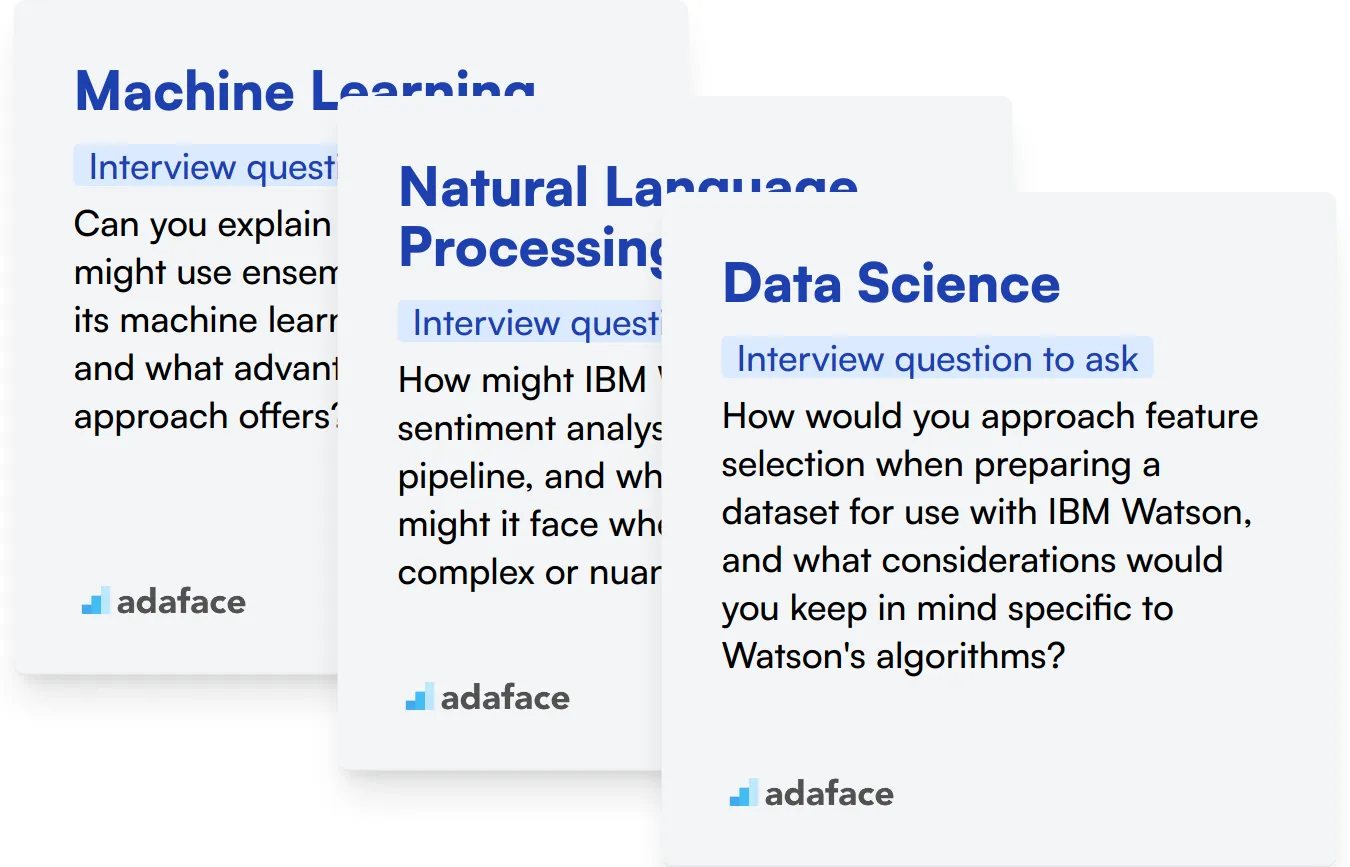
Machine Learning
Machine Learning is at the heart of IBM Watson's capabilities. It enables the system to learn from data, improve performance, and make predictions without explicit programming.
To assess Machine Learning skills, consider using an assessment test with relevant MCQs. This can help filter candidates based on their theoretical knowledge and practical understanding.
During the interview, ask targeted questions to gauge the candidate's depth of knowledge in Machine Learning. Here's an example:
Can you explain how IBM Watson might use ensemble methods in its machine learning algorithms, and what advantages this approach offers?
Look for answers that demonstrate understanding of ensemble methods, their application in complex systems like Watson, and benefits such as improved accuracy and robustness. Candidates should also mention specific ensemble techniques like Random Forests or Boosting.
Natural Language Processing
Natural Language Processing (NLP) is fundamental to IBM Watson's ability to understand and generate human language. It's key for applications in conversational AI, text analysis, and information retrieval.
To evaluate NLP skills efficiently, you might use an online assessment with NLP-focused questions. This can help identify candidates with strong foundations in language processing techniques.
During the interview, ask a question that probes the candidate's understanding of NLP in the context of IBM Watson:
How might IBM Watson use sentiment analysis in its NLP pipeline, and what challenges might it face when analyzing complex or nuanced text?
Look for responses that show an understanding of sentiment analysis techniques, their integration into larger NLP systems, and awareness of challenges like sarcasm detection or context-dependent sentiment. Strong candidates might also mention specific algorithms or approaches used in sentiment analysis.
Data Science
Data Science skills are essential for working with IBM Watson, as they involve extracting insights from large datasets, creating predictive models, and interpreting results. This skill set is crucial for enhancing Watson's analytical capabilities.
To assess Data Science proficiency, consider using a comprehensive data science test. This can help evaluate candidates' knowledge across various aspects of data analysis and modeling.
During the interview, pose a question that explores the candidate's ability to apply data science concepts in an IBM Watson context:
How would you approach feature selection when preparing a dataset for use with IBM Watson, and what considerations would you keep in mind specific to Watson's algorithms?
Look for answers that demonstrate understanding of feature selection techniques, their importance in machine learning models, and awareness of Watson-specific considerations. Strong candidates might discuss dimensionality reduction, handling of categorical variables, or the impact of feature selection on model interpretability.
Hire top talent with IBM Watson skills tests and the right interview questions
When hiring for roles that require IBM Watson skills, it's important to ensure candidates possess the necessary expertise. This ensures that your team can effectively leverage IBM Watson technologies for projects and deliverables.
One of the most accurate ways to assess these skills is through targeted skills tests. Consider utilizing our IBM Watson assessment to gauge the proficiency of your candidates.
After administering the test, you'll be able to shortlist the best applicants based on their performance. This targeted approach helps streamline the interview process and focus on the most qualified candidates.
To get started, you can sign up for an account with Adaface and explore our extensive test library. This will equip you with the tools needed to find and hire top talent for your team.
Cognitive Ability Test
Download IBM Watson interview questions template in multiple formats
IBM Watson Interview Questions FAQs
Look for skills in data science, machine learning, natural language processing, and familiarity with IBM Watson's APIs and services.
Use situational questions and ask for specific examples of projects they've worked on using IBM Watson technologies.
Ask advanced questions about machine learning algorithms, data preprocessing, and complex NLP tasks to gauge their expertise level.
Present real-world scenarios and ask how they would approach solving them using IBM Watson's capabilities.

40 min skill tests.
No trick questions.
Accurate shortlisting.
We make it easy for you to find the best candidates in your pipeline with a 40 min skills test.
Try for freeRelated posts
Free resources




